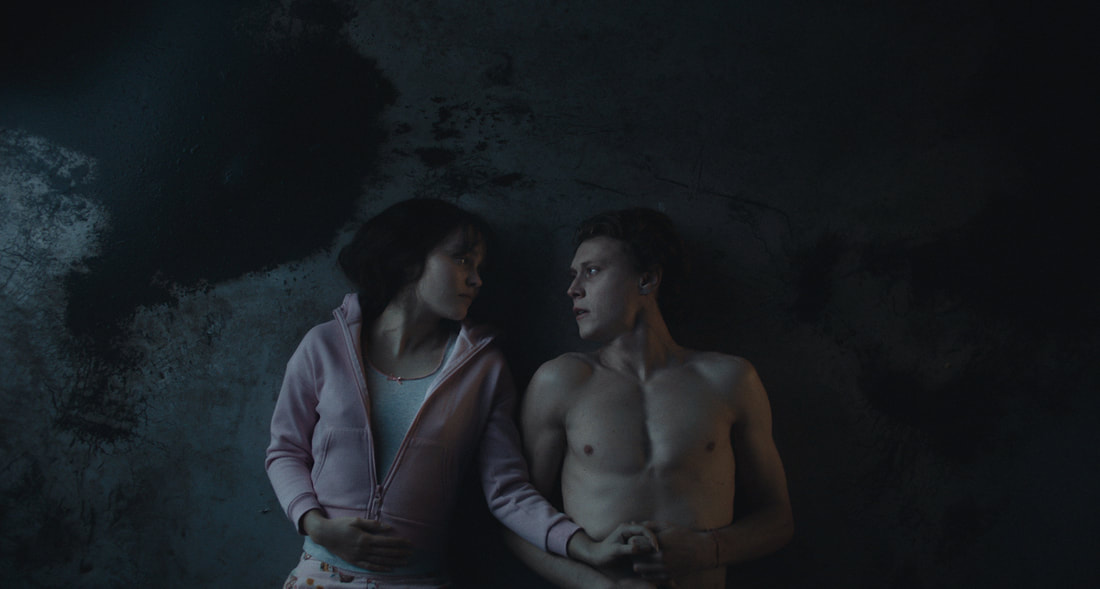|
Lily-Rose Depp and George MacKay in Wolf (2021) In the high-concept Irish drama Wolf, director and writer Nathalie Biancheri explores the subject of species dysphoria. The term references a psychological condition in which a person feels they are trapped in the body of the wrong species, generally an animal. Jacob (George MacKay) believes himself to be a wolf inside a human body. His family sends him to a clinic, where he is forced to undergo extreme “curative therapies” at the hands of The Zookeeper (Paddy Considine). As these so-called treatments grow more disturbing, the only solace Jacob finds is in the enigmatic Wildcat (Lily-Rose Depp), with whom he roams the clinic grounds in the dead of night. Cloaked in darkness and bellowing a resounding howl, this is the only time of day Jacob feels like his true self. Given the air of hopelessness in Jacob’s parents during a visit to the clinic, this place feels like a last resort to “correct” a disorder. The film presents this world in a serious way. The Zookeeper (a scary-good Considine) is free to do as he pleases, taking extreme measures in the name of “treatment”. Biancheri meets serious subject matter with a careful, no-nonsense approach. But perhaps a little too careful, given the more daring ideas she has at play that come and go. George MacKay’s totally fearless performance at the center of Wolf sets a bar the film can’t keep up with.
At the clinic, Jacob shares a communal space (designed like the interior of a prison) with a handful of patients who also have species dysphoria, each identifying as a different animal. There’s German Shepherd (Fionn O’Shea), Parrot (Lola Petticrew), Squirrel (Darragh Shannon), Horse (Elsa Fionuir), and Annalisa/Panda (Karise Yansen) to name a few. Wolf takes an empathetic approach in forgoing the need to explain why everyone is assuming their identities. The reality is that they simply are, and each has done something (unspecified in the film) that led their families to put them in the temporary care of The Zookeeper. He decides when each patient is ready to be released back into the world. Conflict arises whenever he and clinic staff (doctors, nurses, therapists) intervene, often to implement therapy designed to push patients to the absolute edge in order to achieve a breakthrough. In one instance, Parrot (Lola Petticrew)’s feet are held down atop a window ledge as The Zookeeper vehemently encourages her to jump out the window and fly. Using her refusal to jump as proof she’s a girl, not a parrot. The film has quite a few scenes such as this moment, ones where forced tactics are on display, and builds to a terrifying sequence of mockery. Biancheri’s script tries to balance the patients’ identity journeys with the terror they’re experiencing, but feels aimless in deciding on what story to tell. Wolf lingers in memory as melodramatic, with some daring choices made along the way to subvert expectations. When all is said and done, it’s tricky to find a thread to really connect with outside of MacKay and Depp’s work in the film. One of the more consistent elements of Wolf is that the actors are on the same page with the director’s approach. The cast bring a grounded quality to the characters, and never veer into caricature territory. Most impressively George MacKay, who gives one of the best performances of the year. Jacob’s journey and bond with Wildcat grow as the core of this film, and MacKay commands the screen with startling physicality. He’s wrestling with an internal ferociousness, and his uncomfortableness is palpable. From the way he moves and contorts his body, to the sounds he makes, the actor reaches a level of commitment that sets the bar high for his screen partners. Depp gives a great performance as Wildcat but disappointingly, her character becomes more and more of a plot device. Considine’s character veers into similar territory as well with a more stereotypical character. The Zookeeper is a question mark, and Considine plays him to frightening effect. Though uneven and a little too melodramatic for its own good, Nathalie Biancheri’s Wolf engages in some thought-provoking ideas when it comes to approaching species dysphoria. Subverting expectations of a YA genre film, she latches onto a psychological drama and brings a grounded perspective to telling the story. Instead of exaggerating the animal identities, there is a frankness and directness to the approach. The production design and cinematography have a cold, sterile look, mirroring how The Zookeeper and most of the clinic workers operate. There’s no warmth. All the uncertainty about the patients’ futures puts Jacob and Wildcat in conflict, butting heads about the meaning of survival. For Jacob, life is not just about surviving the day, but surviving authentically as he was born to be, and he is willing to jump into the deep end. While Wolf doesn’t reach its potential heights, the film has a strong backbone in George MacKay. Wolf had its world premiere at the 2021 Toronto International Film Festival, and will arrive in theatres across Canada on December 3.
0 Comments
Leave a Reply. |
Archives
June 2024
Categories |


 RSS Feed
RSS Feed